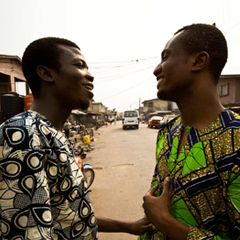Kole Shettima and Erin Sines, Co-Directors, On Nigeria, reflect on grantees work to respond to the pandemic and support people-led social justice movements, while they continued to challenge corruption.
We began 2020 in Abuja, introducing MacArthur President, John Palfrey, and Board Member Paul Klingenstein to our work, meeting grantee partners, and preparing for the culmination of a review of our strategy in Nigeria, which is to reduce corruption by supporting Nigerian-led efforts that strengthen accountability, transparency, and participation. We saw a few news stories about a virus in Wuhan, China, and the Chicago-based members of the team wondered if they should use medical masks on the flight home. Little did we know that it would be the last time our team would meet in person in 2020, that we would soon start to work from home, or that we would still be working from home nearly a year later.
We have now successfully completed the first review of our On Nigeria strategy, our Board of Directors has endorsed a second phase for On Nigeria, and we are close to finalizing our updated approach to support the important work against corruption in Africa’s largest nation. We will continue to support Nigerian civil society, media, and government in their efforts to reduce corruption to ensure that Nigerians receive the transparency, accountability, and good governance to which they are entitled. Yet, upon reflection, arguably the most important work we did in 2020 was to respond to the immediate needs of our grantee partners in moving to serve their communities in a year upended by a pandemic and violence.
As soon as it became clear that COVID-19 would disrupt life as we knew it, our grantee partners mobilized. We assisted by offering funding and flexibility; making rapid-response grants repurposing other funds for COVID-19 response; and sharing information about what the Foundation was doing to protect staff. Despite significant technical challenges and difficult working conditions, grantee partners took action. They fought back against the misinformation that was proliferating in WhatsApp chats and social media. Some created videos and radio jingles in multiple languages to encourage Nigerians to stay safe and wear masks. Others documented human rights abuses perpetuated during the lockdown.
Some advocated for transparent and accountable spending of COVID-19 relief funds. They also filed Freedom of Information requests and launched public interest litigation to compel disclosure of government spending on COVID-19, including on the distribution of emergency food supplies. Some reported on the effects of the pandemic. Other organizations documented the impacts of the lockdown on women and other historically marginalized groups, including people who are incarcerated. They created guidelines on how the government could use its funds during emergencies without violating procurement laws. They trained young people, teachers, and others on COVID-19 prevention and provided personal protective equipment to frontline workers in healthcare and other areas. Religious leaders spoke out, moved to Zoom to preach to their congregations about faith and accountability, and modeled positive and safe behaviors. Others helped to coordinate the health sector response to the pandemic.
For all of the hardships of 2020, there are glimmers of hope—the newly-approved COVID-19 vaccines, the long-overdue racial reckoning that seems to finally be happening in the United States, and the power of people-led social justice movements, notably #EndSARS in Nigeria and Black Lives Matter in the United States and beyond. But for the vaccines to be quickly and equitably distributed, racial justice and equity to be achieved, and the demands of people-led movements to be realized, we will need a strong and vibrant civil society sector, independent media, and government leaders who are committed to carrying out their mandates. Although we did not need to be convinced, 2020 reminded us of the powerful alchemy that happens when they work together.
Most of all, we and our On Nigeria colleagues reflect on the last year with pride and admiration for the work that our grantee partners, did and continue to do. They saved lives. It is our honor and privilege to be able to support their work.



